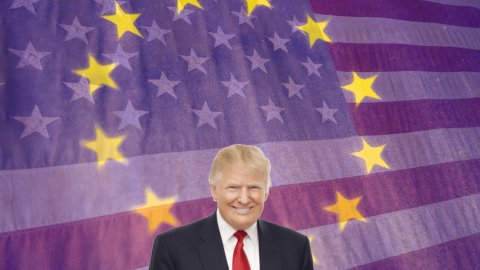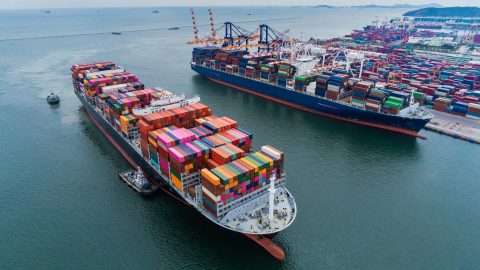The announcement by the US President, Donald Trump, to levy import tariffs on steel (25%) and aluminium (10%) has made waves. Can the favourable economic environment of boom, low inflation, and gradual reduction of the supportive monetary policy be toppled?
Measure does not come as a surprise
Even during his election campaign, the President had declared himself against free world trade. Some of his core statements made reference to nationalism (“America first”) and were against multilateral rules. The most important arguments presented are:
1) a current account deficit is generally bad. However, there is no economic proof to substantiate this claim. Is a country really supposed to produce all goods and services “in-house”? No empirical data substantiating this notion exist.
2) Some trade partners act unfairly. This claim refers mainly to China, and it does hold some water. China has flooded the world market with goods on the back of governmentally subsidised overcapacities.
3) International organisations and multilateral treaties are not particularly useful. This also refers to the WTO. It is true that the countries of the WTO have not been able to agree on a much-needed new regulatory framework in 20 years. However, the conclusion that therefore a unilateral course of action is better cannot be substantiated by data.
4) In the USA, protectionist measures are popular.
Disturbing modus operandi
The way the US government has been handling this situation is disturbing for three reasons: According to the rules of the WTO, protective tariffs may be levied in some cases: strongly rising imports, subsidies, or sales prices below costs. In exceptional cases, danger to national security can also be cited. Given that the “ordinary” cases do not apply, the US administration has actually quoted the latter one.
This challenges the plausibility of the reasoning, since the overwhelming majority of steel and aluminium imports come from countries the USA is friends with; some of them are even NATO members. The statement by the US President that trade wars are good and easily won has alienated many.
Escalation risk
The risk of escalation has increased. The tit-for-tat strategy can easily get out of hand.
1) The countries affected by the US tariffs could levy their own tariffs on imports from the USA.
2) Other countries could levy tariffs on steel and aluminium in order to protect their domestic sector.
3) If the likely lawsuits against the US measures were dismissed by the WTO Court, others could also come up with the idea of imposing tariffs for reasons of national security.
4) This would question the entire regulatory framework of the WTO.
Stagflationary effect
Generally speaking, tariffs on certain products increase the price level of imports. This supports the domestic producers of steel and aluminium. Theoretically, the sales prices and profits of the steel and aluminium producers outside of the USA could come under pressure as a result.
But to a certain degree, the import prices and costs for other companies that process steel and aluminium in the USA will increase. This will partially eat into the profits of these companies, and partially consumer prices will rise. Given that company profits and consumer income do not increase at the same extent, the disposable income will fall, dampening economic growth. Result: higher prices, lower output.
Direct effects not relevant
In terms of GDP, the announced measures are not relevant. Last year, the aggregate amount of goods and services produced amounted to USD 19,738bn (source: OECD). The steel and aluminium industries account for about 0.3% of GDP. Steel and aluminium imports account for less than 0.3% of GDP.
Since the NAFTA partners Canada and Mexico as well as Australia are at least temporarily exempt from tariffs, these values will be still lower. Canada makes up the largest share of imports both in steel and aluminium. Australia is of little relevance.
Conclusion:
The tariffs on steel and aluminium will not have any significant effects on economic growth or inflation. It is “only” the course of action that is disturbing, fuelling the risk of escalation.
Legal note:
Prognoses are no reliable indicator for future performance.
Legal disclaimer
This document is an advertisement. Unless indicated otherwise, source: Erste Asset Management GmbH. The language of communication of the sales offices is German and the languages of communication of the Management Company also include English.
The prospectus for UCITS funds (including any amendments) is prepared and published in accordance with the provisions of the InvFG 2011 as amended. Information for Investors pursuant to § 21 AIFMG is prepared for the alternative investment funds (AIF) administered by Erste Asset Management GmbH pursuant to the provisions of the AIFMG in conjunction with the InvFG 2011.
The currently valid versions of the prospectus, the Information for Investors pursuant to § 21 AIFMG, and the key information document can be found on the website www.erste-am.com under “Mandatory publications” and can be obtained free of charge by interested investors at the offices of the Management Company and at the offices of the depositary bank. The exact date of the most recent publication of the prospectus, the languages in which the fund prospectus or the Information for Investors pursuant to Art 21 AIFMG and the key information document are available, and any other locations where the documents can be obtained are indicated on the website www.erste-am.com. A summary of the investor rights is available in German and English on the website www.erste-am.com/investor-rights and can also be obtained from the Management Company.
The Management Company can decide to suspend the provisions it has taken for the sale of unit certificates in other countries in accordance with the regulatory requirements.
Note: You are about to purchase a product that may be difficult to understand. We recommend that you read the indicated fund documents before making an investment decision. In addition to the locations listed above, you can obtain these documents free of charge at the offices of the referring Sparkassen bank and the offices of Erste Bank der oesterreichischen Sparkassen AG. You can also access these documents electronically at www.erste-am.com.
Our analyses and conclusions are general in nature and do not take into account the individual characteristics of our investors in terms of earnings, taxation, experience and knowledge, investment objective, financial position, capacity for loss, and risk tolerance. Past performance is not a reliable indicator of the future performance of a fund.
Please note: Investments in securities entail risks in addition to the opportunities presented here. The value of units and their earnings can rise and fall. Changes in exchange rates can also have a positive or negative effect on the value of an investment. For this reason, you may receive less than your originally invested amount when you redeem your units. Persons who are interested in purchasing units in investment funds are advised to read the current fund prospectus(es) and the Information for Investors pursuant to § 21 AIFMG, especially the risk notices they contain, before making an investment decision. If the fund currency is different than the investor’s home currency, changes in the relevant exchange rate can positively or negatively influence the value of the investment and the amount of the costs associated with the fund in the home currency.
We are not permitted to directly or indirectly offer, sell, transfer, or deliver this financial product to natural or legal persons whose place of residence or domicile is located in a country where this is legally prohibited. In this case, we may not provide any product information, either.
Please consult the corresponding information in the fund prospectus and the Information for Investors pursuant to § 21 AIFMG for restrictions on the sale of the fund to American or Russian citizens.
It is expressly noted that this communication does not provide any investment recommendations, but only expresses our current market assessment. Thus, this communication is not a substitute for investment advice.
This document does not represent a sales activity of the Management Company and therefore may not be construed as an offer for the purchase or sale of financial or investment instruments.
Erste Asset Management GmbH is affiliated with the Erste Bank and austrian Sparkassen banks.
Please also read the “Information about us and our securities services” published by your bank.



